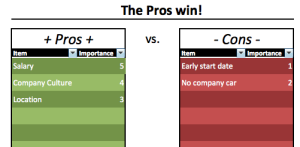To put the job hunt in context, I like to think of the resume round as a regular season game and the interview round as a playoff game.
Anyone who knows sports recognizes that the intensity and stakes are much higher in the playoffs.
So assuming you submitted your resume and were asked back to interview, now is the time to step up your game and bring it. Because the competition is fierce to get quality jobs these days.
With limited job offers going out and qualified candidates interviewing before and after you, you can’t afford to have one weak answer to a behavioral interview question.
That one red flag or lack of persuasion could be the reason you get rejected instead of getting the job.
Before we get into the perfect interview answer to these questions, first you need to have a solid understanding of the behavioral questions and what the employer is really asking you.
What’s A Behavioral Interview Question
When did you display leadership in college?
How has your work experience prepared you for this position?
The two questions above are examples of behavioral interview questions that companies use to gauge if you’re the right fit for the position they’re hiring for.
Can you answer those questions in a compelling way that makes you shine? If not, don’t worry about it. You’ll be a pro after reading and executing the strategies in this post.
Since companies can’t have you work on a project in front of them (it’s unreasonable and would take too much time), they have to ask how you handled previous experiences to gauge your ability to work for them. In other words, they ask questions about your past behavior (where the term comes from) to predict your future behavior in the job you’re interviewing for.
This information is so important to organizations that sometimes the entire interview revolves around eight to ten behavioral interview questions about your technical ability, personality, response to adversity, leadership, or other qualities.
Say the company is looking for a self-motivated and outgoing individual for their open sales position. They’ll ask candidates behavioral questions like, “How do you work on your own?” and “Would your friends say you’re an extrovert or introvert?”
Then, how you answer these questions will determine your fate with the company. So you not only want to do well, you want your responses to be perfect.
The good news is reaching this perfection is easier than you imagine. Because you can craft answers in advance based on what the company wants, which ensures you don’t get tripped up and stare at the interviewer as drool comes down your chin.
Most Common Types
Before we get into how you should answer, you have to understand how these questions will be asked.
So here are some of the most common behavioral questions:
- What in your past makes you ready for this position?
- How have you dealt with failure in the past?
- Please describe your proudest achievement.
- On group projects, do you tend to lead or follow?
- When’s a time when you spoke up against members in your group?
- How do you handle conflict?
- Describe a time when you were able to change a customer’s mind.
- What makes you a team player?
- Tell me how would motivate your employees if you were a manager.
- Are you a slow or quick learner?
There are plenty of other examples of questions online if you Google search it. And sometimes you can find past interview questions of the specific company you’re interviewing for on a site like glassdoor.com.
The main takeaway from this section is that you get an idea of how the questions are worded (and remember why companies ask them—which we said is to project your future performance in the position).
With that understanding in mind, let’s tackle how to successfully answer these questions.
Perfect Behavioral Interview Answers
Here’s where it gets good. You’re going to learn how to combat these questions with flawless execution.
So, what’s a perfect interview answer?
It shares a specific skill or quality you have that gives the interviewer 100% confidence you would behave the same way for their organization. And the way it’s communicated is through a success story.
The reason a story is powerful is because it’s in a human’s DNA to love stories, you market yourself in a positive light, and you also show your awareness to answer what they’re looking for.
The best success stories most often come from a previous work experience or internship because those align most closely to jobs. However, don’t count out stories from student organizations, group projects, or extracurriculars.
As you can believe, it’s going to be impossible to rattle off these perfect success stories on the spot. Please don’t attempt such a thing.
Instead, ahead of time, prepare around 15 different success stories (example below) from your past that cover seemingly every question the interviewer could ask about.
This is where research comes through by checking the company’s website for the job description, their mission statement, and their service or product. Put yourself in their shoes and think of 15 questions they might ask you.
Then literally type up potential questions and your success story responses. And practice speaking your answers out loud (don’t memorize them or it won’t come off natural) or with a friend who acts as the interviewer.
Once you do this preparation, the hard work pays off because you’ll have total control over what you say in any interview.
Example Of A Success Story
You may say this interview tactic is easier said than done.
So how do you do this?
Success stories come down to three simple steps (if it helps, think of it as the C-A-R method—C for context, A for action, and R for result):
C: Start with your story’s context
Like any story, you first need to set the scene and overall context so the interviewer knows the background information around your behavior. This usually involves a quick run down of the who, what, when, where, or why.
If you were asked about a time you overcame adversity, an example response is:
“So I was president of Pre-Law Society last year. And part of my responsibility with my executive team included hosting live meetings where our members would come in and we’d put on a program or bring in a speaker. One time, our speaker cancelled on us the day of the event. It was a nightmare because we had all these students expecting a speaker and we might not have a speaker for them.”
In these stories, there’s no need to overshare. Keep it specific and share only as much as you need.
A: Specifically detail your action
Next, tell them the positive action you took in your story.
In this same sequence on overcoming adversity, it would go like:
“While the rest of my executive team was panicking, I knew that panicking wouldn’t help. I walked out of the room and paced for a few minutes trying to think of a backup plan for our meeting. Then I decided to call every local lawyer and ask if they would come and speak to our group for 30 minutes on short notice. After reaching a few voicemails and some rejections, one criminal defense lawyer said she had a light day and would love to come in to speak.”
Again, stick to the specific details and don’t go on random tangents. Repetitive practice helps you get your story straight and keep the interviewer’s attention.
R: Explain the result and key takeaway
Here you tell the interview what happened because of your action and the high-level analysis of what you learned or took away from it.
The last response in the overcoming adversity example looks like:
“What ended up happening was the speaker who came in on short notice absolutely rocked it. It was one of the best speakers we had that year and the audience thought so too by how many questions they asked her at the end. And that’s an example of how I excel when faced with adversity because I know the best way to overcome it is to take positive action to improve the situation. I could have cancelled the meeting once our initial speaker cancelled, but I knew not to give up so easily. And while I can’t control other people, I can control my actions and attitude, which usually is enough to better the situation—as it did in this example.”
That interviewer is going to think, wow this candidate is exactly what my company needs.
And imagine if you have around 15 of these C-A-R stories in your head ?
No question would be able to trip you up because you’d be ready for everything that came your way.
Final Words
Do the necessary preparation for these behavioral interview questions and they will be a piece of cake on interview day.
This extra work will give you the cool to say exactly what you want, be confident, and connect with the interviewer. Needless to say, execution like this gets you as many job offers as you want.
Now exit out of this blog post. Close your computer screen. And get to work so you have the perfect interview answers ready to go.
The Golden Resume
I thought about ending the post in that last section, but I decided that those serious about their job search would benefit in a big way by grabbing a copy of my Amazon bestselling book The Golden Resume.
So if you want to ensure job search success, this is the exact guide for you. I say this because of my own experience with it and the 60+ reviews on Amazon praising it.
Of all of those reviews, my favorite reviews include this one:
That led me to find The Golden Resume and it is the best purchase I made thus far. We focused on the accomplishments and improving my digital print. My wife helped with proof reading the resume, LinkedIn and my new medium account.
I sent out 7 applications last Thursday night. The next morning I had 2 call backs before lunch. By Saturday I had 4 interviews set. The first time in my life that I had options.
And this one:
I found your book through Evan and wanted to thank you for writing such an engaging book we all can benefit and learn from. I’ve been on the job hunt for over a month now, and finally landed an offer from utilizing your book!
Just as it profoundly helped these two candidates, The Golden Resume will set you up to write a winning resume, secure tons of interviews, and get job offer after job offer.
Make the job hunt much easier on yourself by ordering The Golden Resume from Amazon.



